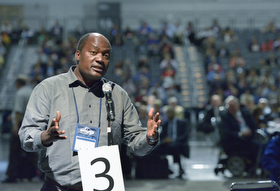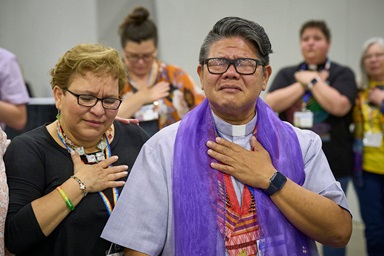Dois planos - o Plano Tradicional e o Plano Tradicional Modificado - apelam aos Metodistas Unidos que desejam manter o status quo na abordagem da igreja à homossexualidade.
“Nós ainda acreditamos literalmente que a Bíblia é a palavra de Deus”, diz o reverendo Forbes Matonga, pastor da Missão Metodista Unida de Nyadire no Zimbábue e proponente do Plano Tradicional. “Nós não acreditamos que a Bíblia é silenciosa sobre este assunto porque temos referências das escrituras que podemos apontar.”

Foto: Paul Jeffrey, SMUN.
O Plano Tradicional - e o seu próximo descendente, o Plano Tradicional Modificado - deixaria muito menos margem de manobra para os Metodistas Unidos que quebram as regras quando se trata da homossexualidade.
"O plano tradicionalista ... coloca em um sistema muito maior de prestação de contas", diz Bispo Sandra Steiner Ball , bispo residente da Conferência da Virgínia Ocidental e um dos moderadores da Comissão Um Caminho a Seguir. “Ele prevê penalidades para aqueles que agirem contra as diretrizes da Disciplina”.
Os planos tradicionais estarão sob consideração na Conferência Geral especial em St. Louis, que acontecerá de 23 a 26 de fevereiro. Os dois serão considerados juntamente com planos que afrouxariam ou removeriam as restrições da igreja sobre o casamento entre pessoas do mesmo sexo e a ordenação de clérigos gays.
Outros planos submetidos à assembléia legislativa da denominação incluem o Plano de Uma Igreja (recomendado pela maioria do Conselho dos Bispos), o Plano da Conferência Conexional e o Plano Simples.
Em outubro, o Conselho Judicial Metodista Unido considerou inconstitucionais alguns elementos do Plano Tradicional, pelo que seriam necessárias alterações antes da aprovação. Os problemas concentram-se na aplicação mais rigorosa de algumas regras para pastores e bispos, mais do que em outros, bem como as preocupações com o devido processo.
A decisão também afeta partes do Plano Tradicional Modificado que se sobrepõem ao Plano Tradicional.
De acordo com os planos tradicionais, a proibição de homossexuais praticantes declarados como autônomos e ordenados como membros do clero Metodista Unido continua, assim como a proibição dos casamentos gays.
Uma das petições do Plano Tradicional inadvertidamente omitiu a palavra “praticar” da frase “auto-declarado homossexual praticante”, disse o Rev. Tom Lambrecht, vice-presidente e gerente geral da Good News. Segundo ele, haverá uma emenda introduzida para corrigir o erro.
Os planos tradicionais acrescentam que todas as conferências anuais devem se certificar que “defenderá, aplicará e manterá os padrões da disciplina (Livro de Disciplina) sobre o casamento e ordenação LGBT.” Ela exige que os bispos, incluindo bispos aposentados, façam o mesmo.
As consequências de violar as regras do Livro de Disciplina sobre a homossexualidade seriam duras e se aplicariam às igrejas e pastores locais.
Os planos tradicionais determinam que aqueles que não se conformarem com a Disciplina sejam “encorajados a formar algo semelhante a uma 'igreja autônoma, afiliada ou concordata'”.
Em outras palavras, deixe a Igreja Metodista Unida. As igrejas que saírem podem usar o nome e o logótipo da Metodista Unida até 2021.
Plano Tradicional Modificado surgiu porque os criadores do Plano Tradicional original tiveram pouco tempo para trabalhar nele. O plano atualizado reforça a aplicação contra os bispos que violam o Livro de Disciplina e concede doações de US $ 200.000 para conferências anuais que deixam a denominação sobre a questão da homossexualidade.
"Alguns de nós sentimos que (o Plano Tradicional) precisava ser mais completo do que era, especialmente toda a questão da responsabilidade", disse o Rev. Maxie Dunnam, presidente emérito do Asbury Theological Seminary em Wilmore, Kentucky. “Estávamos tentando aperfeiçoar (a responsabilidade no plano) para que não houvesse julgamentos constantes. Precisávamos deixar as questões tão claras que não haveria nenhuma dúvida… se uma pessoa as violou ou não”.
* Patterson é um repórter do United Methodist News Service em Nashville, Tennessee. Entre em contato com ele pelo telefone 615-742-5470 ou newsdesk@umcom.org
** Sara Novaes é tradutora independente. Para contatá-la, escreva para IMU_Hispana-Latina @umcom.org



